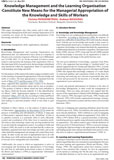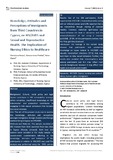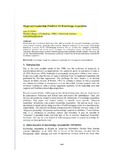The relationship between leadership styles and knowledge aquisition: knowledge-enabled leader. The Australian experience
Knowledge has been identified as one of the most important resources that contribute to the competitive advantage of an organisation. Many firms have reached the conclusion that effective management (acquisition) of knowledge is the only way to leverage their core competencies and achieve competitive advantage. On the other hand, there is extensive literature which argues that leadership often exhibits high performance coupled with job satisfaction, organisational commitment and trust. This triggered intensive interest from both academia and practitioners in studying knowledge management and leadership effectiveness. Despite this interest, there is little empirical research to support the relationship between leadership and knowledge management. This is in part because in the dynamic nature of knowledge capture, dissemination, reward, and creation, leadership does not provide active means (supportive environment) that will advance knowledge acquisition. It's about creating a climate in which sharing knowledge is encouraged, or even demanded. Workers must understand why the organisation has turned to knowledge management and what payoff exists. In view of the increasing internationalisation and globalisation of many organisations this research started by asking; Which leadership style best supports knowledge management (acquisition)? Which leadership style facilitates the management of knowledge? Does leadership have a clear understanding of the strategic role of knowledge management? The answer to these questions is one of the objectives of this paper. The research reported in this paper investigates the relationship between Knowledge Management and the newer leadership dimensions measured by the Manz and Sims's (1987) Self-Management Leadership Questionnaire (SMLQ). It also explores the relationship between Knowledge Management and the more established dimensions of Transformational and Transactional leadership style, Initiating Structure and ConSideration, as measured by Bass's (1985) Multi-factor Leadership Questionnaire (MLQ) and Stogdill's (1963) Leadership Behaviour Description Questionnaire (LBDQ). Questionnaires containing items measuring the above leadership style dimensions and knowledge management were distributed to a large manufactUring organisation. These were subjected to a series of correlational and regression analyses. The analyses conducted produced mixed results: the leadership styles that are characterised by participative behaviour and mutual trust and respect for subordinates' ideas and feelings are correlated stronger with knowledge acquisition when compared with the leadership styles that are characterised by task oriented and autocratic behaviour. Implied in this statement is the leadership style that folds Knowledge Management into the strategy set if the enterprise is to take advantage of the knowledge available in impacting effiCiency, effectiveness, productivity, and competitive position. Such leaders do not manage knowledge but they carry out their mission to effectively apply "and use knowledge from a variety of traditional positions located throughout the enterprise. We choose to call this new breed Knowledge-Enabled Leader (KELdr). Key Words: Knowledge Management, Transformational, Transactional, Initiating Knowledge-Enabled Leader (KELdr).




